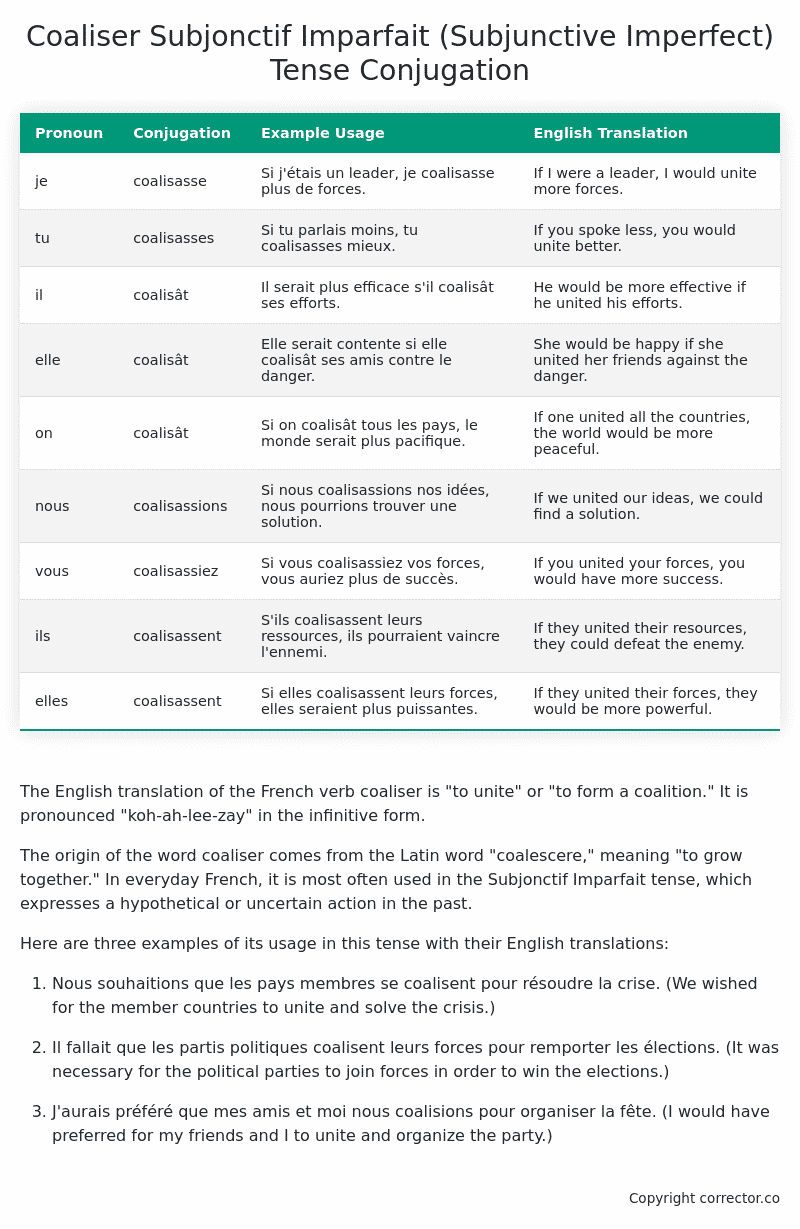Subjonctif Imparfait (Subjunctive Imperfect) Tense Conjugation of the French Verb coaliser
Introduction to the verb coaliser
The English translation of the French verb coaliser is “to unite” or “to form a coalition.” It is pronounced “koh-ah-lee-zay” in the infinitive form.
The origin of the word coaliser comes from the Latin word “coalescere,” meaning “to grow together.” In everyday French, it is most often used in the Subjonctif Imparfait tense, which expresses a hypothetical or uncertain action in the past.
Here are three examples of its usage in this tense with their English translations:
-
Nous souhaitions que les pays membres se coalisent pour résoudre la crise. (We wished for the member countries to unite and solve the crisis.)
-
Il fallait que les partis politiques coalisent leurs forces pour remporter les élections. (It was necessary for the political parties to join forces in order to win the elections.)
-
J’aurais préféré que mes amis et moi nous coalisions pour organiser la fête. (I would have preferred for my friends and I to unite and organize the party.)
Table of the Subjonctif Imparfait (Subjunctive Imperfect) Tense Conjugation of coaliser
| Pronoun | Conjugation | Example Usage | English Translation |
|---|---|---|---|
| je | coalisasse | Si j’étais un leader, je coalisasse plus de forces. | If I were a leader, I would unite more forces. |
| tu | coalisasses | Si tu parlais moins, tu coalisasses mieux. | If you spoke less, you would unite better. |
| il | coalisât | Il serait plus efficace s’il coalisât ses efforts. | He would be more effective if he united his efforts. |
| elle | coalisât | Elle serait contente si elle coalisât ses amis contre le danger. | She would be happy if she united her friends against the danger. |
| on | coalisât | Si on coalisât tous les pays, le monde serait plus pacifique. | If one united all the countries, the world would be more peaceful. |
| nous | coalisassions | Si nous coalisassions nos idées, nous pourrions trouver une solution. | If we united our ideas, we could find a solution. |
| vous | coalisassiez | Si vous coalisassiez vos forces, vous auriez plus de succès. | If you united your forces, you would have more success. |
| ils | coalisassent | S’ils coalisassent leurs ressources, ils pourraient vaincre l’ennemi. | If they united their resources, they could defeat the enemy. |
| elles | coalisassent | Si elles coalisassent leurs forces, elles seraient plus puissantes. | If they united their forces, they would be more powerful. |
Other Conjugations for Coaliser.
Le Present (Present Tense) Conjugation of the French Verb coaliser
Imparfait (Imperfect) Tense Conjugation of the French Verb coaliser
Passé Simple (Simple Past) Tense Conjugation of the French Verb coaliser
Passé Composé (Present Perfect) Tense Conjugation of the French Verb coaliser
Futur Simple (Simple Future) Tense Conjugation of the French Verb coaliser
Futur Proche (Near Future) Tense Conjugation of the French Verb coaliser
Plus-que-parfait (Pluperfect) Tense Conjugation of the French Verb coaliser
Passé Antérieur (Past Anterior) Tense Conjugation of the French Verb coaliser
Futur Antérieur (Future Anterior) Tense Conjugation of the French Verb coaliser
Subjonctif Présent (Subjunctive Present) Tense Conjugation of the French Verb coaliser
Subjonctif Passé (Subjunctive Past) Tense Conjugation of the French Verb coaliser
Subjonctif Imparfait (Subjunctive Imperfect) Tense Conjugation of the French Verb coaliser (this article)
Subjonctif Plus-que-parfait (Subjunctive Pluperfect) Tense Conjugation of the French Verb coaliser
Conditionnel Présent (Conditional Present) Tense Conjugation of the French Verb coaliser
Conditionnel Passé (Conditional Past) Tense Conjugation of the French Verb coaliser
L’impératif Présent (Imperative Present) Tense Conjugation of the French Verb coaliser
L’infinitif Présent (Infinitive Present) Tense Conjugation of the French Verb coaliser
Struggling with French verbs or the language in general? Why not use our free French Grammar Checker – no registration required!
Get a FREE Download Study Sheet of this Conjugation 🔥
Simply right click the image below, click “save image” and get your free reference for the coaliser Subjonctif Imparfait tense conjugation!

Coaliser – About the French Subjonctif Imparfait (Subjunctive Imperfect) Tense
Formation
Common Everyday Usage Patterns
Interactions with Other Tenses
Subjonctif Présent
Indicatif Passé Composé
Conditional
Conditional Perfect
Summary
I hope you enjoyed this article on the verb coaliser. Still in a learning mood? Check out another TOTALLY random French verb conjugation!


